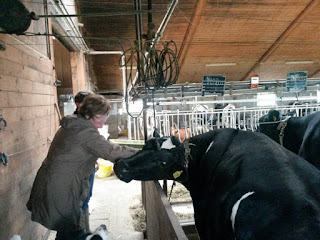On the 8th of May, 2017, we went to the water treatment plant in
Birsfelden called Ara Birs. Basel (Switzerland) has five(5) bigger
plants and 22 smaller ones. The first two that was built in a very long
time was built in the year 1963 and 1977 and was renovated and
re-modernized in 2007. The company's name Ara Birs was derived from a
river called Aare which passes through Bern, Solothun and Aargau and its
mouth enters the Rhein river. They recycle rain water, waste water from
habitat and water from roadside. The waste water of about 1000 habitat
goes to Ara Birs for treatment.During raining season, they are able to
collect about 4000 cubic meter of water everyday for treatment.
The
recycling goes through 4 processing, first it goes through mechanical
cleaning, where bigger particles are separated from the water then from
there it goes through another mechanical cleaning where smaller
particles are separated from the water and to the chemical processing
where more oxygen is added to the water and in the next process the
water is allowed to settle and some of the sewage sludge that settled is
collected into the digester chamber to produce methane gas to produce
about 40% of electricity they use. They have solar panels all round that
produces about 25% to 30% of electricity and in all they produce about
65 to 70% themselves. We were also favored by one of their bosses who
decided to buy us three tickets to watch F.C. Basel soccer match on
Sunday. We came home from there.
After
supper we went to Auntie Regula's farm to see what they do there. It
was really nice. The whole family are hard workers. The dad, the mum and
the children. We saw the fat cows they had, the fat dog and cats, the
fat and sporty horses, the rabbits and how the milk was taken from this
fat cows. The machines and the processes used there were beautiful. We
had the chance to taste some cold fresh milk and to ride on the horse
back. It was really fun. All the cows had there names and even the dog
was called Deeva, it was lovely. On the farm, nothing goes waste, the
water from the home of the farmer and his children which is on the farm
goes into a big tank and its used to water the the plants to be sold and
the grasses to feed the animals during summer. The droppings of the
cows are used as manure to fertilize the land for planting. The milk of
the cows collected are sold and they are able to collect about 1400
litre s of milk per day.
After there I went to play soccer with DEF.C.

















